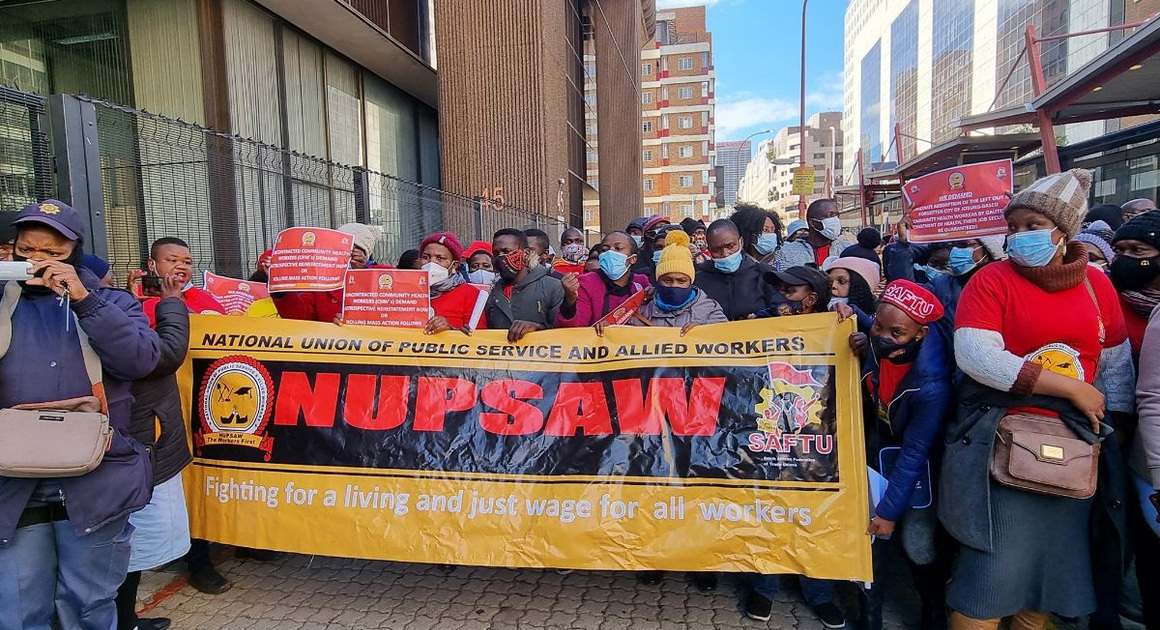Victory for Workers 27,000 Community Health Workers win official recognition through their union

After years of being treated as volunteer labour, tens of thousands of South African CHWs are finally getting integrated into the public health permanent workforce. The journey started in 2016.

Jesse Saidu
Background
Tens of thousands of South African Community Health Workers have won formal recognition as official public health workers after a long-fought campaign by PSI members from the National Union of Public Service and Allied Workers (NUPSAW). Solly Malema, NUPSAW’s General Secretary, said: "We started organising these workers in 2016 by mobilising marches and campaigning nationwide. The government thought they could outsource poverty wages forever. We proved them wrong."
The Fight
For decades, South Africa’s Community Health Workers (CHWs) were treated as disposable labour. They worked in clinics and remote villages, testing for HIV, tracing Tuberculosis (TB) patients, and supporting maternal health, yet they were paid stipends as low as R3,500 (about $185) per month with no job security. Crecia, a CHW from Pretoria, recalled the struggle: "We were like ghosts. We were working for clinics but paid by NGOs. When we demanded our rights, the Department said 'you're NGO staff' and NGOs said 'we just pay you, talk to the government.' For years, we had no employer, just empty promises."
CHWs began organising, but they recorded difficulties when some unions turned them away, dismissing them as "volunteers." Crecia remembered the rejection: "We knocked on a lot of the unions’ doors. They said, ‘We only help permanent staff.’ Then we found NUPSAW. That’s when the doors finally opened."
In 2016, NUPSAW started organising the workers and campaigned nationwide for their recognition as essential public health workers. NUPSAW didn’t just protest against the issue; they provided a policy direction.
Before 2018, CHWs were not even a recognised sector. But now we are the backbone of healthcare in South Africa
The Turning Point
In 2018, the union secured Resolution 1, a landmark agreement recognising CHWs as permanent public health employees. Zacharia Mokgothu, a CHW leader in Gauteng, explains its impact: "Before 2018, CHWs were not even a recognised sector. But now we are the backbone of healthcare in South Africa. The Minister himself said NHI can’t work without us."
By 2020, the government integrated 6,000 CHWs in Gauteng province as permanent public health employees with benefits like medical care and housing allowances. Crecia, who now earns around R12,000 monthly, reflects: "We were living from hand-to-mouth. But now I provide for my family, cover my expenses and have also gone back to school because of NUPSAW.”
The Lesson for Unions
The CHWs’ success wasn’t overnight. It was a relentless collective action of all workers. When we organise, we win together; NUPSAW’s actions prove that even "informal" workers win big. Malema said, "Governments create ‘temporary’ jobs to kill public services. Our duty is to fight back and protect these workers."
The union’s strategy was simple: "Nothing about us without us." CHWs like Zacharia were at the centre of the drafting of the Resolution alongside labour leaders and experts: "We sat with NUPSAW and drafted Resolution 1 ourselves. Unions must let workers lead their own battles."
Unions must stop waiting for ‘perfect’ workers. The exploited need us most
What Lies Ahead
The outcome of Resolution 1 of 2018 in Gauteng is now going national. In July 2025, South Africa’s Health Minister Aaron Motsoaledi announced the inclusion of 27,000 CHWs into the national public health workforce during his budget presentation. This is a result of NUPSAW’s relentless pressure. "We are thrilled to see this significant milestone achieved. The permanent employment of CHWs is a serious statement. This is NUPSAW’s victory, no debate," Zacharia said. But Crecia cautions the fight isn’t over: "There are still thousands of CHWs waiting. Some have worked for 20 years without benefits. We can’t stop now.
PSI is supporting unions around the world to win rights for Community Health Workers, securing recent wins in Colombia and Pakistan. Informal workers are among the most exploited employees in the world of work. Unions must continue to seek out ways to organise these categories of workers in the public and private sectors. Malema added that, "Unions must stop waiting for ‘perfect’ workers. The exploited need us most. Find them. Fight for them. Win."